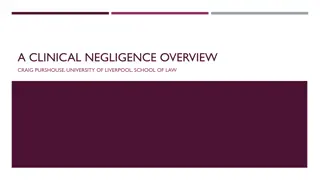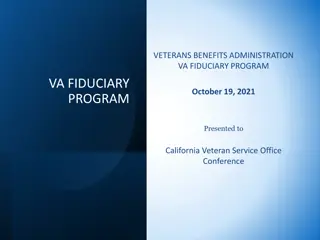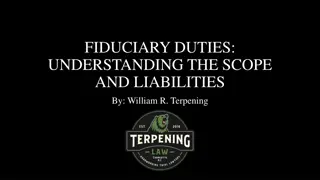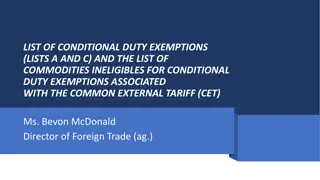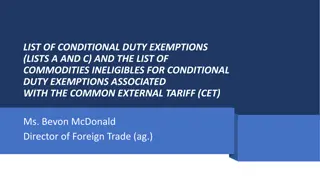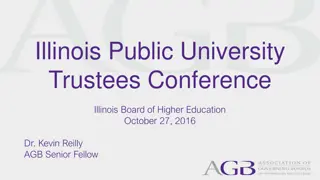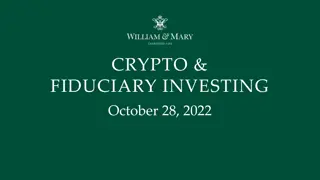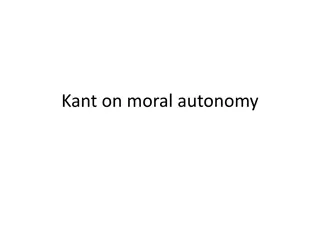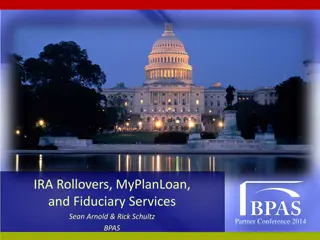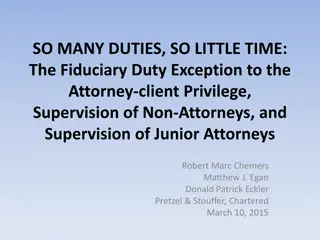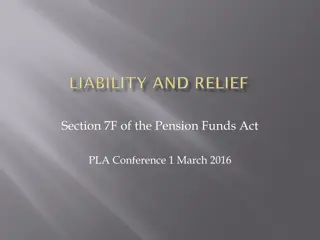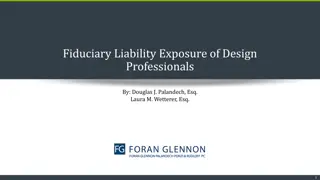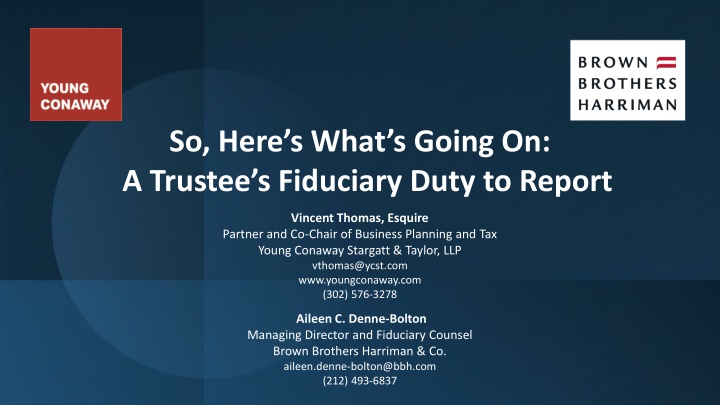
Delaware Trustee's Fiduciary Duty to Report: Legal Insights and Guidelines
Explore the fiduciary duty of trustees in Delaware to report essential information to beneficiaries, supported by case law examples and statutory provisions. Understand the scope of reporting responsibilities and the regulatory framework for trust management.
Download Presentation

Please find below an Image/Link to download the presentation.
The content on the website is provided AS IS for your information and personal use only. It may not be sold, licensed, or shared on other websites without obtaining consent from the author. If you encounter any issues during the download, it is possible that the publisher has removed the file from their server.
You are allowed to download the files provided on this website for personal or commercial use, subject to the condition that they are used lawfully. All files are the property of their respective owners.
The content on the website is provided AS IS for your information and personal use only. It may not be sold, licensed, or shared on other websites without obtaining consent from the author.
E N D
Presentation Transcript
So, Heres Whats Going On: A Trustee s Fiduciary Duty to Report Vincent Thomas, Esquire Partner and Co-Chair of Business Planning and Tax Young Conaway Stargatt & Taylor, LLP vthomas@ycst.com www.youngconaway.com (302) 576-3278 Aileen C. Denne-Bolton Managing Director and Fiduciary Counsel Brown Brothers Harriman & Co. aileen.denne-bolton@bbh.com (212) 493-6837
A Delaware Trust Fiduciarys Duty to Report is a Common Law Duty Delaware is not a UTC state Guidance regarding scope of duty: Delaware Case Law Restatement (Second) and Restatement (Third) of Trusts Case Law from Other Jurisdictions Certain Delaware statutory provisions also are implicated in carrying out the duty
DUTY TO REPORT IN DELAWARE: General Rule McNeil v. McNeil, 798 A.2d 503 (Del. 2002) A trustee has a duty to furnish information to a beneficiary upon reasonable request. Furthermore, even in the absence of a request for information, a trustee must communicate essential facts, such as the existence of the basic terms of the trust. That a person is a current beneficiary of a trust is indeed an essential fact. This duty may be modified, restricted, expanded, or eliminated in the trust instrument pursuant to 12 Del. Code 3303(a), which permits the creation under Delaware law of so-called silent trusts. 3
DUTY TO REPORT IN DELAWARE: Case Law Beyond McNeil A number of Delaware cases provide guidance on how a trustee should report under the standard set forth in McNeil, including: Graham v. Graham, No. 2018-0084-MTZ, 2020 WL 13854376 (Del. Ch. Jan. 30, 2020), aff d, 249 A.3d 105 (Del. 2021) Tigani v. Tigani, No. 2017-0786-KSJM, 2021 WL 1197576 (Del. Ch. Mar. 30, 2021), aff d, 271 A.3d 741 (Del. 2022) In re Tr. FBO DuPont Under Tr. Agreement dated Aug. 4, 1936, No. 12904-MG, 2018 WL 4610766 (Del. Ch. Sept. 25, 2018). The of the power. NHB Advisors, Inc. v. Monroe Capital LLC, 2013 WL 6906234 (Del. Ch. Dec. 27, 2013). Rende v. Rende, No. 2021-0734-SEM, 2023 WL 2180572 (Del. Ch. Feb. 23, 2023). 4
DUTY TO REPORT IN DELAWARE: Case Law Beyond McNeil A number of Delaware cases provide guidance on how a trustee should report under the standard set forth in McNeil, including: Mennen v. Wilmington Tr. Co., No. CV 8432-ML, 2015 WL 1914599 (Del. Ch. Apr. 24, 2015), adopted, (Del. Ch. 2015), aff'd sub nom. Mennen v. Fiduciary Tr. Int'l of Delaware, 166 A.3d 102 (Del. 2017) President and Fellows of Harvard College v. Glancy, No. Civ.A. 18790, 2003 WL 21026784 (Del. Ch. Mar. 21 2003). Lynch v. Barba, No. CV 12083-MG, 2018 WL 1613834 (Del. Ch. Apr. 3, 2018), adopted, (Del. Ch. 2018). Deputy v. Deputy, C.A. No. 10874-VCZ, 2020 WL 1018554 (Del. Ch. Mar. 2, 2020). Rogers v. Wilmington Tr. Co., No. 21-1473, 2022 WL 621690 (3d Cir. Mar. 3, 2022), cert. denied, 143 S. Ct. 406, 214 L. Ed. 2d 201 (2022). T In Matter of Thomas Lawrence Reeves Irrevocable Tr. Under Agreement Dated Feb. 26, 1997, No. CV 8071-ML, 2015 WL 1947360 (Del. Ch. Apr. 29, 2015), adopted, (Del. Ch. 2015). 5
DUTY TO REPORT IN DELAWARE: To Whom Must the Trustee Report? Generally, a trustee s duty to report flows to the current beneficiaries (McNeil) and potentially the presumptive remainder beneficiaries (Graham v. Graham; Tigani v. Tigani) of a trust. However, if a more remote beneficiary s interests are implicated in a specific matter, such beneficiary likely will be entitled to information. No duty to potential beneficiaries whose interest is dependent upon the exercise of a limited testamentary power of appointment while the powerholder is still alive, whether or not a valid exercise has been executed. (In re Tr FBO Dupont) 6
DUTY TO REPORT IN DELAWARE: To Whom Must the Trustee Report? RESTATEMENT (THIRD) OF TRUSTS A trustee has a duty to promptly inform fairly representative beneficiaries of the basic information about the trust, their beneficial statuses, and the trusteeship. Generally, this duty can be satisfied under the Restatement (Third) by providing information to current beneficiaries and to those who would be entitled or eligible to receive distributions of income or principal if either the trust or current interests were then to terminate (i.e., the presumptive remainder beneficiaries). If trust is revocable, duty is only to living grantor who has capacity 7
DUTY TO REPORT IN DELAWARE: To Whom Must the Trustee Report? SPECIAL CASE - MINOR OR INCAPACITATED BENEFICIARY Specific Language in the Trust Instrument Appointment of a designated representative or someone with some level of virtual representation Parent or Guardian Trustee must be cognizant of material conflicts of interest Delaware s Virtual Representation Statute (12 Del. C. 3547) provides insight on such conflicts Appoint a designated representative Under 12 Del. C. 3339 8
DUTY TO REPORT IN DELAWARE: What Must a Trustee Report? Essential Facts Significant Developments or Changes Material Information Necessary for a Beneficiary to Protect its Interest Information Reasonably Requested by a Beneficiary Trustee does not need to provide the same level of information to all beneficiaries, but should treat similarly-situated beneficiaries the same 9
DUTY TO REPORT IN DELAWARE: What Must a Trustee Report? McNeil - Essential Facts Not clearly defined, but likely includes: Existence and basic terms of the trust (e.g., identity of settlor and trustee) Person s beneficial status and nature of their interest (i.e., current, remainder, vested, contingent, whether the person is a discretionary distributee or is supposed to receive all net income from the trust, etc.) Essential trust terms or side/ancillary agreements affecting trust administration (likely dependent on specific facts of the matter, but could include things like no-contest provisions, trust termination provisions, etc.) Information specifically required to be disclosed by the trust instrument Annual tax reports alone likely insufficient 10
DUTY TO REPORT IN DELAWARE: What Must a Trustee Report? Significant Developments or Changes Changes in beneficial status Specific events in the trust instrument that increase or limit beneficial rights Trust protector exercising authority to add or remove beneficiaries Significant changes concerning the trust and its administration Change in scope of permitted investments Change in standard of care or exculpation or indemnification standards Removal and appointment of fiduciaries Change of situs Trust decanting or merger Significant nonroutine transactions Selling trust s only asset (e.g., real property or privately-held stock) Trustee effecting a significant borrowing or lien upon trust estate 11
DUTY TO REPORT IN DELAWARE: What Must a Trustee Report? Material Information Necessary for a Beneficiary to Protect its Interest Scope of beneficiary s rights dictates what constitutes material information needed to protect their interests Examples: Information regarding the trust s administration and investments Changes in beneficial status Changes to trust administrative provisions Specific information can fall under any number of the above categories Trustee does not have to report every single action the trustee takes if not significant or does not otherwise affect a beneficiary s interest 12
DUTY TO REPORT IN DELAWARE: What Must a Trustee Report? Restatement (Third) of Trusts 82 Trustee to provide the following information to the fairly representative beneficiaries: Trust essentials - existence, source, and name of the trust Beneficiary s status - extent and nature of the beneficiary s interest and any significant changes in such interest If beneficiary is a discretionary distributee, trustee should advise what information it requires or would like in connection with making distribution decisions Basics regarding trusteeship - name(s) of trustees, contact information, compensation, and roles of any co-trustees or co-fiduciaries 13
DUTY TO REPORT IN DELAWARE: What Must a Trustee Report? Restatement (Third) of Trusts 82, cont. Significant changes include Change in trustee circumstances (identity, number, roles, compensation, delegation of important roles) Important adjustments to investment strategies Significant transactions (especially involving hard-to-value assets or assets with special sensitivities to beneficiaries) Plans for distribution on termination or subdivision of trust Other transactions or developments of which beneficiaries should be made aware and thereby allowed an opportunity to offer suggestions or information or request reports or accountings 14
DUTY TO REPORT IN DELAWARE: What Must a Trustee Report? Restatement (Third) of Trusts 82, cont. Beneficiary has the right to request more information, including a copy of the trust instrument Trustee has a duty to respond to requests for information and to permit all beneficiaries to inspect trust records A court may restrict the extent of such requests, weighing the beneficiary s interest against the burdens and privacy concerns Generally, a beneficiary is always entitled to information reasonably necessary to enable beneficiary to prevent or redress a breach of trust or otherwise enforce rights under the trust instrument Restatement (Third) of Trusts 83 Provides for reports to be sent at reasonable intervals on request of all beneficiaries (not just fairly representative beneficiaries) Commentary indicates that it is a good idea to send reports to non- requesting fairly representative beneficiaries without request 15
DUTY TO REPORT IN DELAWARE: What Must a Trustee Report? SPECIAL CASE SIGNIFICANT TRUST OWNERSHIP OF BUSINESS Trustee may be acting as a manager, partner, officer, or director of a business owned entirely or in a significant amount by the trust Duty to investigate or monitor management of entity or inform and report to beneficiaries regarding entity-level activities (whether or not carried out by trustee) will depend on circumstances such as Whether Trustee is directed or excluded as to entity management Degree of the trust s ownership Management structure of entity Significance of the asset to the trust Remoteness of beneficiary Directed trustee or excluded co-trustee likely still has a duty to report 16
DUTY TO REPORT IN DELAWARE: When Must a Trustee Report? No clear-cut timeframes or deadlines apply, but the duty is ongoing Generally, a trustee should report: Within a reasonable time of assuming the role of trustee When the trustee discovers essential facts about the trust When a beneficiary attains the age of majority Upon the occurrence of or in anticipation of significant developments or material changes Promptly upon reasonable request of a beneficiary The reasonableness of the request may depend on the volume of information sought, speed at which it is sought, the relevance of the information to the beneficiary s interest, and frequency of such requests Many trustees choose to provide statements of trust assets and liabilities, receipts, and disbursements on a regular basis, such as monthly or annually 17
DUTY TO REPORT IN DELAWARE: Relation to 12 Del. Code 3585 Statute of Limitations Reporting starts the clock ticking for statute of limitations and laches purposes Under 12 Del. Code 3585, the statute of limitations on claims for breach of duty starts to run when the trustee sends a report that adequately discloses the facts constituting a claim A report adequately discloses such facts if it provides sufficient information so that the person knows of the claim or reasonably should have inquired into its existence. 12 Del. Code 3585(b) Beneficiary is presumed to have received the trustee s report 7 days after it was sent. 12 Del. Code 3585(b) If the beneficiary is a minor without a representative, the statute is tolled until the beneficiary attains the age of majority 18
DUTY TO REPORT IN DELAWARE: Relation to 12 Del. Code 3585 Statute of Limitations For purposes of a report under 12 Del. Code 3585, the report may be sent to the beneficiary, the designated representative of a beneficiary, or a person permitted to virtually represent a beneficiary under 12 Del. Code 3547. A report may be sufficient for purposes of 12 Del. Code 3585, but this doesn t necessarily mean that such report alone is sufficient to meet a trustee s common law duty to report. Likewise, a report may satisfy a duty to report but not provide adequate disclosure to start the running of the statute of limitations 19
DUTY TO REPORT IN DELAWARE: How Should the Trustee Send the Report? 12 Del Code 3534 - Unless the trust instrument expressly provides otherwise, a trustee may provide any report, notice, or communication to the beneficiary or the beneficiary s representative by: Regular U.S. mail or commercial carrier to the address the trustee reasonably determined to be the person s address or to the address at which the person consented to receive notice By fax or email to the number or address at which the person consented to receive notice By posting on an electronic network, provided the posting is delivered to the person By any other form of electronic communication to which the person consented By any other manner reasonably suitable under the circumstances and likely to result in receipt by the person. 20
DUTY TO REPORT IN DELAWARE: Directed Trustees and Excluded Co-Trustees Directed trustees and excluded co-trustees generally have curtailed powers as to certain areas of the trust administration, but trust instrument language seldom relieves the trustee of the duty to inform and report in favor of the co-fiduciary with direction authority or exclusive powers. As a result, the directed trustee and excluded co-trustee should not assume they have no notice obligations. The answer will be completely dependent upon the language in the trust instrument. 21
DUTY TO REPORT IN DELAWARE: Directed Trustees and Excluded Co-Trustees In the case of co-trustees with no modified duties, each trustee has an independent duty to report and should ensure either: It makes the required reports itself OR It verifies that someone else is making them and that they are complete In the case of a directed trust, such as where there is an investment direction adviser, and the trust is silent on the duty to report, the trustee should assume the duty remains with it and obtain the information it needs to complete its report from whoever has access or control over such information. If the trustee must obtain information necessary for its reports from another person, the trustee should review the information to make sure it is complete and request more information as needed. 22
DUTY TO REPORT IN DELAWARE: Remedy for Failure to Abide by Duty Depends on facts and circumstances of trust and breach: Requirement to provide inventory and accounting Voiding actions of trustee (i.e., decanting or merger) Damages and payment of fees and expenses Removal as fiduciary 23
DUTY TO REPORT IN DELAWARE: Silent Trusts and Designated Representatives In response to McNeil, the Delaware legislature enacted statutes to permit a settlor to modify, expand, or eliminate a trustee s duty to inform, permitting silent trusts. 12 Del. C. 3303(a)(1) provides that the terms of a trust instrument may expand, restrict, eliminate, or vary [t]he rights and interests of beneficiaries, including, but not limited to, the right to be informed of the beneficiary s interest for a period of time (the Silent Period ). The Silent Period under the statute is a flexible concept and can be determined with reference to (but is not limited to) the following: Period of years (e.g., 20 years after the creation of the trust) Age attainment (e.g., when the beneficiary reaches the age of 35) Event certain to occur (e.g., settlor s death) Combination of two periods (e.g., the later of the beneficiary reaching the age of 35 or the settlor s death) 24
DUTY TO REPORT IN DELAWARE: Silent Trusts and Designated Representatives To address the issue of enforcement of the trust provisions during the Silent Period, the statute provides that the beneficiary may be represented and bound by a designated representative for both judicial proceedings and nonjudicial matters. The designated representative: May receive notice in connection with trustee s duty to inform Has standing to sue on beneficiary s behalf May represent the beneficiary in other nonjudicial matters (e.g., consents, releases, and ratifications pursuant to 12 Del. Code 3588, receipt of reports pursuant to 3585, non- judicial settlement agreements pursuant to 3338, or non-judicial modification agreements pursuant to 3342) 12 Del. Code 3339 provides that a designated representative is presumed to be a fiduciary and subjects to personal jurisdiction of Delaware regarding trust matters Designated representative must accept the appointment in writing or otherwise agree to serve in such capacity through service or similar action 25
DUTY TO REPORT IN DELAWARE: Silent Trusts and Designated Representatives A person may become a designated representative in several ways: By express appointment or reference to 12 Del. Code 3339 in the trust instrument By authorization, appointment, or direction in the trust instrument to represent or bind a beneficiary in connection with a judicial proceeding or nonjudicial matter By appointment by a person expressly authorized to do so under the trust instrument To the extent no designated representative is appointed and serving under the above, by appointment by the settlor To the extent no designated representative is appointed and serving under the above, by appointment by a beneficiary If a settlor appoints a designated representative: The settlor may not appoint themselves or a related or subordinate party within the meaning of I.R.C. 672 The settlor must provide notice to the beneficiary s parents, custodian, or guardian of the property within thirty days of the appointment 26
DUTY TO REPORT IN DELAWARE: Avoiding Potential Traps in Silent Trusts Use express language prohibiting the provision of information. During a trust s Silent Period, the trustee must abide by the terms of the trust instrument as to what information, if any, to give to a beneficiary whose right to be informed has been altered. May report , need not report , and shall have no obligation to report puts a trustee in a difficult position because such language could be open to different interpretations. Address the possibility of a beneficiary learning of the existence of the trust Give the trustee the power to terminate the Silent Period or provide that the Silent Period automatically terminates upon such occurrence. Require the trustee to explain the settlor s intent in structuring the trust in such fashion or to deliver a letter of wishes drafted by the settlor in such circumstances, perhaps with the backstop of providing the trustee with flexibility to terminate the Silent Period. 27
DUTY TO REPORT IN DELAWARE: Avoiding Potential Traps in Silent Trusts Avoid Conflicting Notice Provisions The drafter should ensure that there is a designated representative to exercise withdrawal rights in an otherwise valid silent trust If faced with conflicting notice provisions, the trustee will need to weigh the breach of the silent trust provisions against the conflicting provision, or perhaps petition the court for instructions Termination of Silent Period for some but not all beneficiaries Inform the beneficiary for whom the Silent Period has terminated that the Silent Period has not terminated as to others so trust information should not be shared. 28
DUTY TO REPORT IN DELAWARE: Avoiding Potential Traps in Silent Trusts Conflicted Designated Representative A designated representative who is also a beneficiary or holds another fiduciary role in the trust may not be able to prioritize the interests of the beneficiary they represent. A trustee should examine the case-specific facts for potential conflicts. The trustee should remain vigilant for the duration of the representation of any conflict of interest that may arise later. Beneficiary Executes a Pre-Nuptial Agreement requiring them to disclose their interest in a trust Corporate Transparency Act requirement to obtain current information from trust beneficiaries who are Beneficial Owners under FinCen regulations. 29
DUTY TO REPORT IN DELAWARE: Some Basics Regarding Virtual Representation 12 Del. C. 3547 Provides methods whereby a beneficiary may be virtually represented in a judicial proceeding or non- judicial matter. 12 Del. C. 3547(a) - Person or their designated representative may represent and bind a person who is not otherwise represented and is a minor, incapacitated or unborn, or is a person whose identity or location is unknown and not reasonably ascertainable, if they have a substantially identical interest with respect to the particular question or dispute and have no material conflict of interest in the matter. 30
DUTY TO REPORT IN DELAWARE: Some Basics Regarding Virtual Representation, cont. 12 Del. C. 3547(b) Presumptive remainder beneficiary, their designated representative or the person authorized to represent the presumptive remainder beneficiary under any other subsection of Section 3547, may represent and bind contingent successor remainder beneficiaries if no material conflict of interest in the particular question or dispute. Contingent successor remainder beneficiary, their designated representative or the person authorized to represent the contingent successor remainder beneficiary under any other subsection of Section 3547) may represent and bind more remote contingent successor remainder beneficiaries if no material conflict of interest in the particular question or dispute. 31
DUTY TO REPORT IN DELAWARE: Some Basics Regarding Virtual Representation, cont. 12 Del. C. 3547(c) subject to any consent required for exercise of the power: Holder of general power of appointment or their designated representative may represent and bind persons whose interests, as takers in default, are subject to the power Holder of a broad nongeneral power of appointment (i.e. that only excludes the holder, the holder s estate or the creditors of the holder or the holder s estate) or their designated representative, may represent and bind persons whose interests, as takers in default, are subject to the power, to the extent that neither the holder nor the designated representative, if any, has a material conflict of interest in the particular question or dispute. 32
DUTY TO REPORT IN DELAWARE: Some Basics Regarding Virtual Representation, cont. 12 Del. C. 3547(d) If not otherwise represented under 3547(a) or (b): Surviving and competent parent(s), parent with sole custody or guardian of the property of the beneficiary may represent minor/incapacitated beneficiary if no material conflict of interest with either parent in the particular question or dispute. Parent may represent unborn beneficiary if no material conflict of interest. Parent(s) may also represent another minor, incapacitated, unborn, or unascertainable person who has substantially identical interest as represented person if no material conflict between such beneficiaries. 33
DUTY TO REPORT IN DELAWARE: Some Basics Regarding Virtual Representation, cont. 12 Del. C. 3547(f) - Presumption of Material Conflict of Interest Representative would be appointed to a fiduciary or nonfiduciary position (unless already serving in another position and will not receive greater authority, broader discretion, or increased protection) Representative already serves in a fiduciary or nonfiduciary position and will receive greater authority, broader discretion, or increased protection Representative has any other actual or potential conflict of interest with the represented beneficiaries with respect to the particular question or dispute Differing investment horizon Interest in present income over capital growth 34
DUTY TO REPORT IN DELAWARE: Best Practices Follow the terms of the trust instrument, unless contrary to applicable law Keep detailed accounts and records Provide each current and possibly presumptive remainder beneficiary (or their designated representatives) with: Information that affects their rights Information on beneficiary s status Basic information, including existence, name, and how it was created Information on right to obtain further information Information about the trusteeship If beneficiary is a discretionary distributee, information about how the trustee makes distribution decisions and what information would be helpful to the trustee 35
DUTY TO REPORT IN DELAWARE: Best Practices Provide each current and possibly presumptive remainder beneficiary (or their designated representatives) with: Information about significant changes (including advance notices of any such changes) Change of fiduciaries, their roles, methods and rates of compensation, standard of care, etc. Delegation of fiduciary obligations Significant transactions Changes in other administrative provisions 36
DUTY TO REPORT IN DELAWARE: Best Practices Treat similarly situated beneficiaries similarly Be fair and impartial in the treatment of beneficiaries Be regular and consistent in reporting. This means be consistent in the form of the report and timing. A formal policy for situations where the default duty to inform and report applies can be helpful Take special care with closely held entities and business interests held by the trust. These may require the trustee to exercise additional oversight and consider not just the beneficiaries, but shareholders or other interests Assess the trust and trust administration process for any conflict of interest issues that may arise at any time during the administration of the trust Confirm consent to electronic delivery of reports if not expressly provided for in the trust instrument Play it safe when discretionary and vague language applies to the trustee s fiduciary duties and liabilities under the trust instrument 37
Vincent C. Thomas is Partner in and Co-chair of Young Conaway Stargatt & Taylor, LLP s Business Planning and Tax Section. He is a Member of the American College of Trust and Estate Counsel (ACTEC) and served as a law clerk to Chief Justice Myron Steele of the Delaware Supreme Court and a Wolcott Fellow for the Delaware Court of Chancery. Mr. Thomas is recognized as a national speaker and authority on the administration of Delaware statutory and common law trusts, as well as complex tax and business transactions for high net worth individuals. He earned an undergraduate degree in Accounting from the University of Delaware, his J.D. degree, magna cum laude, from Widener University Delaware Law School, and his LL.M. in Tax from Villanova University Charles Widger School of Law. Mr. Thomas is admitted to the practice of law in Delaware. 39
Aileen C. Denne-Bolton is a Managing Director and Fiduciary Counsel in Brown Brothers Harriman & Co. (BBH). Over her many years at BBH, Ms. Denne-Bolton has had various senior roles in the BBH Trust Company in New York, covering wealth planning, fiduciary administration, operations, legal, compliance and risk, including over 10 years as Director of Institutional Trust Services to the insurance and reinsurance clients of BBH. Ms. Denne-Bolton joined BBH s Office of the General Counsel in 2015, as Fiduciary Counsel to the BBH Trust Companies in the U.S. and the Cayman Islands. Prior to joining BBH, Ms. Denne-Bolton practiced trusts and estate law at Kelley Drye & Warren LLP, with a focus on estate planning, fiduciary administration and fiduciary litigation. Ms. Denne-Bolton completed a B.A. Moderatorship at Trinity College Dublin (Ireland), a postgraduate Diploma in Library and Information Studies at University College Dublin (Ireland) and graduated cum laude from Boston University School of Law. Ms. Denne-Bolton is admitted to the bars of Massachusetts and New York and is a member of the Society of Trust and Estate Practitioners (STEP), the Trust Counsel Committee and the National Conference of Lawyers and Corporate Fiduciaries of the American Bankers Association, and the Irish American Bar Association of New York. 40
Young Conaway Stargatt & Taylor, LLP Rodney Square | 1000 North King Street | Wilmington, DE 19801 Attorney-Client Privilege & Attorney Work Product16
Disclaimer The presentation is for general informational purposes only. It is not intended as professional legal, accounting or tax advice, and any such intention or advice is expressly disclaimed. The application and impact of laws can vary widely based on the specific facts involved, or may change, and you should consult directly with your legal, accounting, or tax advisor with respect to your particular inquiries and needs. Neither Brown Brothers Harriman & Co. nor its professionals render tax or legal advice. Neither the Young Conaway Stargatt & Taylor LLP or any of its attorneys, Brown Brothers Harriman & Co. or any of its professionals, nor any presenter is responsible for any errors or omissions contained in this presentation. All information is provided as is , with no guarantee of completeness, accuracy, timeliness, and without warranty of any kind, express or implied. In no event will Young Conaway Stargatt & Taylor LLP, its attorneys, or Brown Brothers Harriman & Co. and its professionals or any presenter be liable to you or anyone else for any decision made or action taken in reliance on any information in this presentation or for any consequential, special or similar damages, even if advised of the possibility of such damages. This presentation does not reflect the opinions of Young Conaway Stargatt & Taylor LLP or Brown Brothers Harriman & Co. Circular 230 Disclosure: To comply with U.S. Treasury Regulations, any information contained in this presentation is not intended or written to be used, and cannot be used by the recipient or any other person, for the purpose of (1) avoiding penalties or any other restrictions that may be imposed under the Internal Revenue Code or any other applicable tax law, or (2) promoting, marketing or recommending to another party any transaction, arrangement or other matter in violation of the IRC or any other applicable law or regulation. Brown Brothers Harriman & Co. ( BBH ) is used to reference the company and its affiliates. All trademarks and service marks included are the property of BBH or their respective owners.

